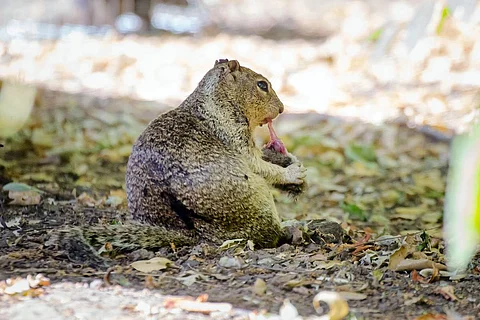

The sheer mention of a squirrel might make you associate all things adorable with them. These arboreal rodents nibbling on kernels and nuts, being shy of attention and peeping out of a tree trunk is what comes to mind. However, new research shows that these harmless tree-dwelling creatures can double up as stealthy predators and feast on voles — if need be.
A new study, titled ‘Vole hunting: novel predatory and carnivorous behavior by California ground squirrels’ published in Springer Nature Journal has concluded that California ground squirrels are ‘opportunistic omnivores’.
This study, which is led by the University of Wisconsin-Eau Claire and the University of California, Davis, is the first to record empirical evidence about widespread meat-eating behavior among squirrels.
“The observations occurred in 2024 — the 12th year of the Long-term Behavioral Ecology of California Ground Squirrels Project conducted at Briones Regional Park in Contra Costa County. Out of 74 observed interactions with voles between June and July, 42 per cent involved active hunting of these small rodents by ground squirrels,” the study noted.
“This was shocking,” lead author Jennifer E. Smith remarked — Smith is an associate professor of biology at UW-Eau Claire who leads the long-term ground squirrels project with Sonja Wild of UC Davis.
“We had never seen this behavior before. Squirrels are one of the most familiar animals to people. We see them right outside our windows; we interact with them regularly. Yet here’s this never-before-encountered-in-science behavior that sheds light on the fact that there’s so much more to learn about the natural history of the world around us,” the scientist added.
What is alarming about this research is that not just curious onlookers, even wildlife experts had no inkling of this omnivorous behaviour exhibited by squirrels.
Wild, the other researcher was equally aghast and didn’t believe the data that her students had gathered from the field.
“No, I’m not sure what you’re referring to,” she straightway told her juniors.
Her students then provided videographed evidence of what they were referring to.
“I could barely believe my eyes… From then, we saw that behaviour almost every day. Once we started looking, we saw it everywhere,” the researcher was quoted in an article published by UC Davis.
According to the researchers, squirrels’ ability to adapt as omnivores helps them respond to changes in food availability and might assist them in surviving in environments that are rapidly changing due to human interference.